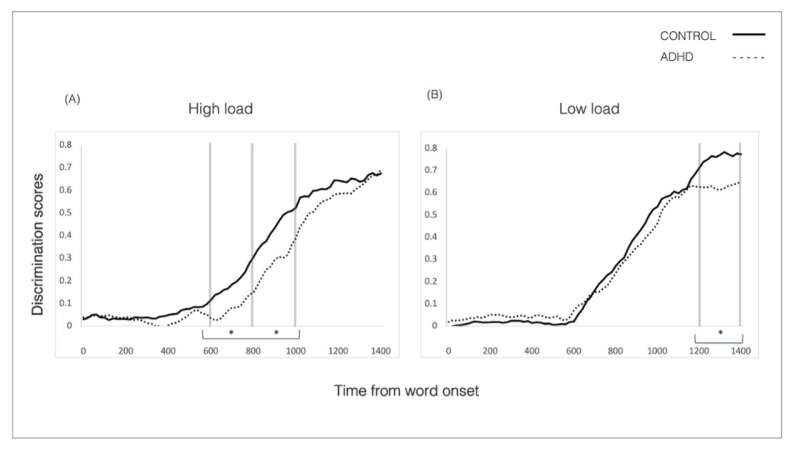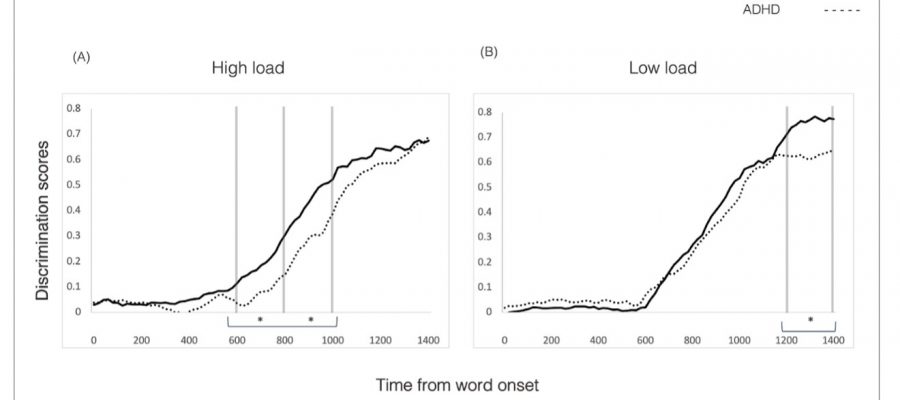
A new study by Prof. Boaz Ben-David and Rony Lemel of Reichman University’s Baruch Ivcher School of Psychology has found that Attention-Deficit Hyperactivity Disorder (ADHD) causes a delay in speech perception and difficulty in understanding the meaning of spoken sentences.
The results of the study show that background noise takes a heavy toll on students with ADHD. The researchers investigated the effects of ADHD on spoken-word processing in noisy conditions. This is the first study to examine “online” (real-time) speech processing in young people with ADHD by using an eyetracker.
Students with ADHD may fall behind when the teacher (or university lecturer) is speaking and there are murmurs in the background. Research shows that these students lose precious time as they try to understand the words being spoken, and by the time the next word comes along they are already behind. The consequence of this is clear—they get lost. The solution is simple, but difficult to implement: silence.
Understanding speech is an ability that enables interpersonal communication and is essential for an active life and emotional well-being. Processing speech in a noisy environment is necessary in everyday conditions and frameworks, such as school, work and social interactions.
The understanding of speech involves the executive functions of inhibition (delaying a response), sustained attention, selective attention, working memory, and planning and executing tasks. People with ADHD often have difficulty controlling and managing these actions. However, there are is almost no research in the literature to date that has studied the relationship between speech and ADHD.
The study was carried out at the Communication, Aging and Neuropsychology lab (CANlab) at Reichman University, in collaboration with the Attention Lab, headed by Prof. Lilach Shalev Mevorach, at Tel Aviv University. The researchers conducted an experiment with subjects from two groups (with and without ADHD) who were asked to perform a task in noisy conditions simulating common situations such as a classroom or a family meal.
The experiment was conducted using an eyetracker device, the only method that enables an analysis of processes in real time. The findings showed that the group with ADHD had a delay/slowdown of half a second in performing the task, that is, a delay in processing speech. When it comes to speech, half a second is a long time—when you lose a word here and a word there, it adds up, and you may end up missing the context and meaning of the sentence.
Previous studies have found that people with ADHD need an optimal signal-to-noise ratio to properly process and recognize spoken words. Given the results of the study, it appears that young people with ADHD are impaired both in recognizing and processing speech in environments with a lot of background talk and noise.
Recognition and processing requires attention, attention mobilization, inhibition and working memory capacity. People with ADHD have to make more effort to listen in noisy conditions, and mobilize more resources than are available to them, which leads to a delay in understanding. This impairment may have serious consequences that will negatively affect the quality of life of those who suffer from it.
Other studies have demonstrated impaired working memory in people with ADHD. In the current study, the researchers found that all the subjects (both those with and without ADHD) had the same level of working memory, which was tested before the experiment. However, in situations with high cognitive demands, there were differences in working memory between the two groups—the subjects with ADHD experienced memory impairment.
Prof. Boaz Ben-David, speech scientist and head of the Communication, Aging and Neuropsychology lab (CANlab) at the Baruch Ivcher School of Psychology at Reichman University, says, “People with ADHD ‘miss’ words during a conversation or lecture, and once that accumulates, they have difficulty understanding the meaning of the sentences that have been said. The effort people with ADHD have to make in order to cope with distractions dilutes their cognitive resources, affects their ability to use their working memory effectively, and impairs their perception and processing of speech.”
The findings are published in the journal Research in Developmental Disabilities.
More information:
Rony Lemel et al, Listen up! ADHD slows spoken-word processing in adverse listening conditions: Evidence from eye movements, Research in Developmental Disabilities (2022). DOI: 10.1016/j.ridd.2022.104401
Journal information:
Research in Developmental Disabilities
Source: Read Full Article
